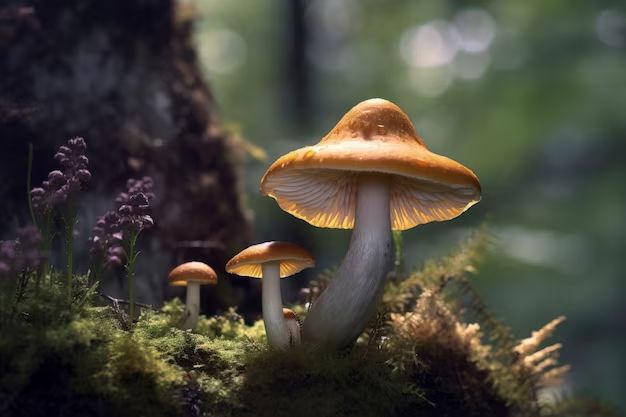Mushrooms have a long and fascinating history, dating back thousands of years. In ancient Greece, mushrooms were known by several names that give insight into how they were viewed and used. The most common Greek terms for mushrooms reveal connections to Greek mythology and medicine.
The Greek Goddess Artemis and Agaricon
One of the earliest Greek names for mushrooms was “agaricon.” This derives from “Agaricos,” an ancient Greek epithet meaning “of Artemis.” Artemis was the Greek virgin goddess of the hunt, wilderness, wild animals, and vegetation. She was associated with forests and uncultivated land. The connection between Artemis and agaricon suggests mushrooms were seen as a food of the wild woods and untamed nature over which Artemis ruled.
In Greek legends, Artemis was linked to the lore of mushrooms. One myth claimed that mushrooms first sprouted where drops of her breast milk fell to earth. Another legend states that Agaricos was a nymph who angered Artemis and was transformed into a mushroom as punishment. These myths portray mushrooms as part of the primal realm of goddesses and enchanted forests.
Mykes and Ancient Greek Medicine
Another early Greek term for mushrooms was “mykes.” In Theophrastus’ Enquiry into Plants from the 3rd century B.C., he refers to edible mushrooms as “mykes.” The word “mykes” is also found in Greek medical texts such as the work of Pedanius Dioscorides, a 1st century Greek physician. He describes the poisonous and non-poisonous mushrooms, referring to them interchangeably as “mykes” or “agarica.”
Ancient Greek doctors drew connections between mushrooms and medicine. Hippocrates, the “father of medicine,” mentioned mushrooms in his writings on using diet to treat disease. Some toxic Greek mushrooms were used as early anesthetics. So the Greek term “mykes” indicates mushrooms were viewed not just as wild food but as having curative properties.
To Fungos – The Modern Greek Word
The modern Greek word for mushroom is “fungos.” This derives from the Latin “fungus” and did not come into use until the Middle Ages after Greece was ruled by the Roman Empire. In ancient Greek, “fungus” referred specifically to the mushroom parasite that grew on cereal crops.
The Latin-based “fungos” replaced the early Greek terms as the common name for mushrooms in general. But echoes of words like “agaricon” and “mykes” remain in the scientific classification of mushrooms today. The genus of mushrooms Agaricus gets its name from the ancient “agaricon” tied to the goddess Artemis.
Mushroom Names Linked to Mythology and Medicine
The names used for mushrooms in ancient Greece provide windows into how mushrooms were perceived. The earliest Greek terms paint mushrooms as foods of the wilderness associated with goddesses and mythical wood nymphs. They were also seen as having ambiguous health properties, poised between poison and cure.
Here is a table summarizing some of the key Greek mushroom names and their meanings:
| Greek term | Meaning |
|---|---|
| Agaricon | “Of Artemis”, ties mushrooms to Greek goddess of wild places |
| Mykes | Used in Greek medical texts, suggests curative properties |
| Fungos | Modern Greek term derived from Latin “fungus” |
The changing vocabulary for mushrooms in ancient Greece reveals how perceptions shifted over time. With roots in Greek myth, mushrooms were first viewed as wild foods of the primal wilderness. But they later became integrated into Greek medicine as both poisons and possible cures. The names reflect mushrooms’ ambiguous identity – edible yet possibly dangerous, untamed yet beneficial.
Conclusion
The Greek terms “agaricon” and “mykes” provide insight into how ancient Greek society viewed mushrooms growing in the wild forests under the domain of Artemis. Tied to myth and medicine, mushrooms were liminal foods that straddled realms of nature and culture. The origins of the modern “fungos” illustrate the influence of the Roman Empire in spreading Latin terminology. But vestiges of the earliest Greek names remain embedded in modern mushroom taxonomy. The Greek names for mushrooms reveal an ongoing interplay between mythology, language, and science in human efforts to grapple with the marvels and mysteries of the fungal world.


